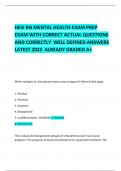Exam (elaborations)
HESI RN MENTAL HEALTH EXAM PREP EXAM WITH CORRECT ACTUAL QUESTIONS AND CORRECTLY WELL DEFINED ANSWERS LATEST 2025 ALREADY GRADED A+
- Course
- Institution
HESI RN MENTAL HEALTH EXAM PREP EXAM WITH CORRECT ACTUAL QUESTIONS AND CORRECTLY WELL DEFINED ANSWERS LATEST 2025 ALREADY GRADED A+
[Show more]



